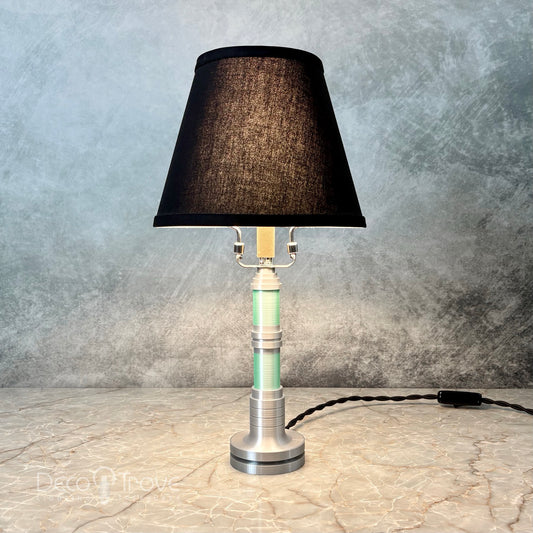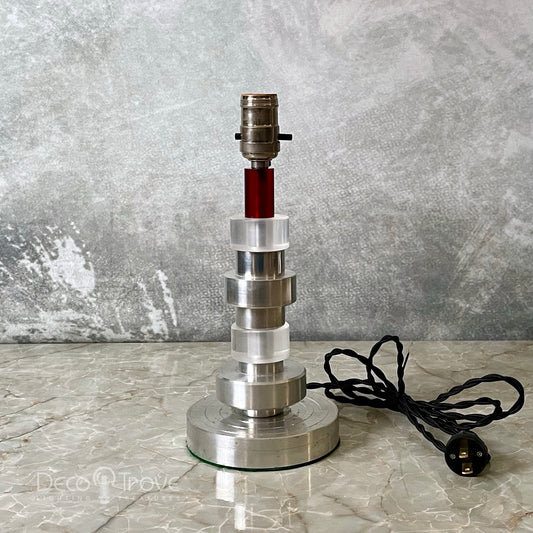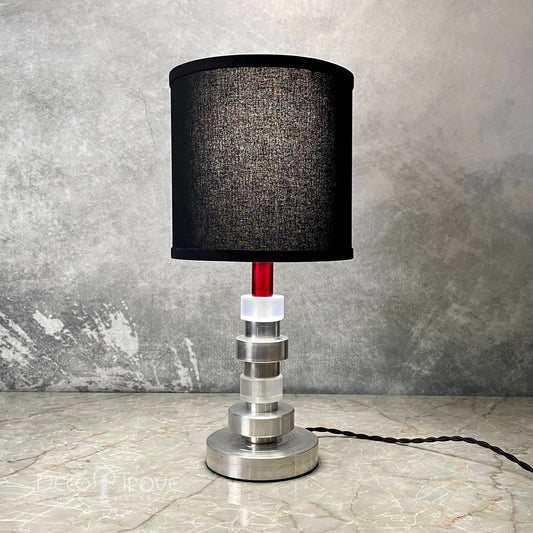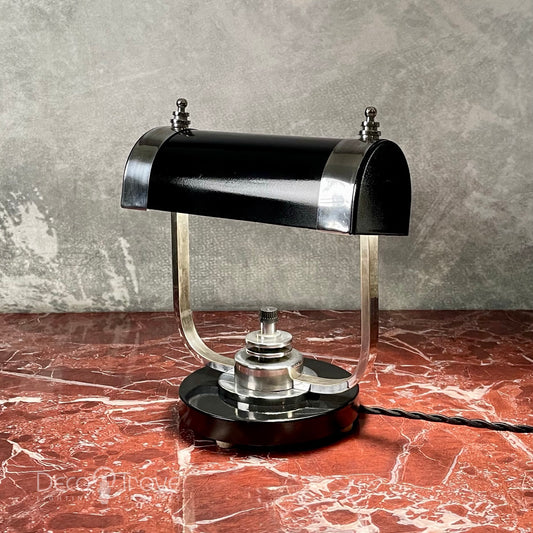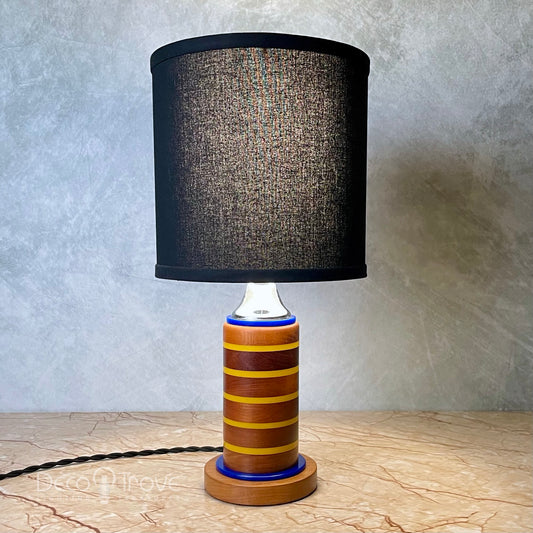Uncovering The History of Pattyn Products
Share
Among design collectors, Pattyn Products lamps are considered some of the finest examples of early 20th-century American modern design. The company successfully created iconic lighting that bridges multiple styles, from Art Deco and Streamline Moderne to Mid-Century Modern.
Pattyn Products (later Modern Products Corporation) was one of the most intriguing small manufacturers of the 1940s. The company produced several renowned Streamline Moderne and Bauhaus-influenced lamps, which now appear in private collections and prestigious museums across the U.S., including the Minneapolis Institute of Art, Cooper Hewitt, Kirkland Museum of Fine & Decorative Art, MoMA, and the Metropolitan Museum of Art.


Pattyn Products Lamp model 310, (c1946) - Pattyn Products. Photo from collection of Author.
Introduction
The company utilized some of the best new materials of the era, such as Bakelite, a very early phenolic resin-based plastic, Micarta (phenolic laminate), Lucite, and spun aluminum. Pattyn lamp designs often featured an innovative blend of modern and traditional materials, such as Bakelite and brass, arranged in horizontal bands. This emphasis on horizontal lines strongly reflected the Streamline Moderne aesthetic, evoking a sense of speed and movement.
Several lamp designs utilized an intriguing and novel way to diffuse and direct light through a series of discs and frosted glass. This diffusion technique is very reminiscent of early designs by German-American designer Walter von Nessen, which appear in the August 1930 issue of House Beautiful (Nessen Studio 161). A close-up view of a similar lamp was featured in the August 1930 issue of House & Garden (Kahn 46). Many museums and auction houses have attributed the model 310 lamp design to Walter von Nessen under contract for Pattyn Products.
The design closely resembles von Nessen’s earlier work, but there is currently no documentation to confirm the attribution to him. The earliest known record of this lamp dates to March 1946, three years after von Nessen’s death in 1943. While this does not definitively confirm or refute the attribution, it highlights the need for more extensive research to clarify the lamp’s origins.

Walter von Nessen - Nessen Lighting.

Glass & Disc Desk Lamp, Walter von Nessen - (1930) - (Nessen Studio 161).

Close-up of Glass & Disc Desk Lamp, Walter von Nessen - (1930) - (Kahn 46).
About Pattyn Products
Despite the possible designer’s prominence and the firm’s recognition among collectors and museums, little is truly known about the Mo-Town company responsible for producing many of these remarkable lamp designs.
Pierre Paul Pattyn, a Belgian-American immigrant born on February 16, 1902, founded Pattyn Products in Detroit, Michigan, in 1942, partnering with his brother Julian Rene Pattyn (The Directory 208). Little is known about the company’s early years but its founding coincided with the United States’ entry into World War II, a time when there was a high demand for aluminum and skilled machinists to support the war effort. It’s unclear whether Pierre and his brother initially intended to produce lighting and other household goods or if their company was established to contribute to wartime production. Throughout his career, Pierre Pattyn was an entrepreneurial and inventive figure, founding and managing several companies, while also holding numerous patents.
The earliest evidence of this comes from another venture, Michigan Radio Parts, which eventually became U.S. Radio Products, Inc. Founded in the mid-1930s, the company specialized in designing and manufacturing radio components and seemed to be thriving by 1939. In fact, Pierre placed an ad in Radio News that year with the headline “HELP! YOU HAVE SWAMPED US.” The ad informed customers that demand for their RX-18 all-wave tuning assembly had far surpassed expectations, leading the company to expand into a new manufacturing facility. This move would also allow them to introduce a full range of new products (Radio News 52).
Pattyn Products went through several different phases and changed name a few times over the years to keep up with its shifting market focus. It was known as
The company maintained its main location at 11840 Harper Avenue and branch plant at 11808 Harper Avenue as of 1946
Pierre and his brother Julian were charged years later with failure to pay property taxes assessed on the location at 11840 Harper Avenue in 1946 by the city of Detroit (Proceedings 915). The company moved to a location at 8026 Kercheval St (Modern Products Corporation 75), then to a location in Cadillac Tower at 65 Cadillac Square in July 1950 (Modern Products Corporation 167), and finally to a location at 1349 East Milwaukee Ave (“Modern Products Corp., Bankrupt” 28).
Likely in an effort to diversify the business, Pattyn began experimenting with other inventions, most notably games and electronic musical instruments. Most of the patents held by Pattyn are related to several of his musical inventions. It was during these efforts in 1951 while Pierre was in the process of manufacturing a new type of instrument, he was arrested and charged with unlawful stock sales. A flood of investors angry about the slow timeline to roll out the new instrument brought the issue to the prosecutors office (“Broker-Inventor Held” 7).

Pierre P. Pattyn from Detroit Free Press Article (Sep 15, 1951) - (“Broker-Inventor Held” 7).
Unfortunately it's not really known if Pattyn had an active role in designing any of the iconic lighting his company was known for or if it was all employee/contract designed. The only known lighting patent that was issued to Pierre Pattyn was a 1952 patent for a three-way push button switch

Pierre P. Pattyn Patent for Push-Button Multiple Switch (Oct 7, 1952) - (Pattyn Push-Button Multiple Switch).
Pattyn's Modern Products Company filed for bankruptcy and was liquidated through an announcement in the Detroit Free Press on Dec 2, 1951. The newspaper listed the court-ordered sale of assets that included: "Alum. Lamp Standards, Top Spacers, Discs, Plates, Rings, Lamp Shade Parts..." (“Modern Products Corp., Bankrupt” 28).

Bankruptcy & Liquidation Announcement in the Detroit Free Press. (“Modern Products Corp., Bankrupt” 28).
Documented Lamp Designs
The most well-known and celebrated Pattyn Products lamp is the iconic model 310. Designed in the Streamline Moderne style, it features a stacked six-disc shade surrounding a frosted glass cylinder. The spun aluminum body has several stepped sections and is accented with brass, layered between alternating black and red Bakelite bands that wrap around the form. Stepped brass finials adorn both the top and bottom of the disc shade.
It appears in a 1946 advertisement in the Detroit Free Press (shown below). The lamp is displayed alongside a Chase “Crescent” bookend, designed by Walter von Nessen around 1935 and discontinued in 1942 due to World War II. While von Nessen’s connection to the lamp is unconfirmed, it was common in product photography at the time to style objects from the same designer together in this way.
The model 310 is believed to have first been produced after World War II, starting in 1946. However, it may have been made as early as 1942, before wartime restrictions took effect. Further research is needed to determine whether Pattyn was designing or manufacturing lighting prior to the end of the war.

Pattyn Products Lamp model 310 - 1946 Ad in the Detroit Free Press. (A. J. Doyle & Co. 94).
The advertisements below feature two different Pattyn lamps, each with unknown model numbers.
The lamp on the left is the same model featured in an additional advertisement and rare brochure (shown below). The base consists of a series of stepped circular sections. The column rises in a segmented, tiered shape, with cylindrical sections separated by narrower bands. This model is fairly uncommon but can be viewed at the Kirkland Museum of Fine and Decorative Art in Denver, Colorado.
The lamp on the right is even rarer. Its design features a tapered, spun form that leans slightly more toward traditional aesthetics while still reflecting Art Deco influences. This particular model is exceptionally rare, seldom appearing for sale or as part of museum collections.


Machined Aluminum Lamp Ad - Better Homes & Gardens July 1950

Photo of an extraordinarily rare Pattyn Products lamp brochure. Likely from the late 1940's or early 1950's. Posted to Facebook in 2016. (Stitt).
Design Variations
The 310 lamp comes in a few variations. Most have brass rings at the bottom, but some, like the one from the Carnegie Museum, do not. Another difference lies in the height of some sections and the chamfered edges, which likely changed during the production run. Some versions tend to have a shorter base and larger chamfers, while later, more common models are slightly taller with smaller chamfers.

Pattyn Products 310 Lamp variation that omits brass rings from the lower section. (Carnegie Museum of Art).
Other Attributed Lamps
It's not known how many different lamp models were designed by Pattyn Products but we are continually uncovering evidence that there was indeed a full line-up beyond the few lamps that advertising was found for.
The table lamp below exhibits hallmarks of both Pattyn Products and Walter von Nessen's design style. This lamp's base and "separator neck" are notable for utilizing Micarta (a brand of phenolic resin layered with cloth or paper) and bakelite integrated into horizontal bands similiar to the 310 lamp. This model's number and documentation are unknown.

The lamp pictured below features the same style of phenolic laminate base as the lamp above and includes the same inset details on the top of the aluminum base. Additionally this lamp was purchased by its owner from an estate sale within the vicinity of Pattyn Products' original locations in Detroit. The design may be incomplete as the shade and socket were missing when purchased.

"Detroit Art Deco Lamp." (Arondoski).
This 1940s Streamline Deco lamp features a phenolic laminate base, likely Micarta, similar to the bases seen in the lamps pictured above. The design follows the same streamlined aesthetic, incorporating a series of Lucite discs in varying sizes, separated by inset spun aluminum sections with gold line accents. The strong resemblance to lamps attributed to Pattyn Products and similar manufacturers suggests a possible connection to the company. The use of Micarta for the base, along with the layered construction, reflects the period’s emphasis on modern materials and sleek, industrial-inspired design.

Laminate and Aluminum w/Gold Inset Lamp, (c1948) - Unknown Manufacturer. Photo from collection of Author.
The lamp below is one of our own and is available for sale on our site. It features an inset aluminum body and a stepped base, closely resembling the design of the Pattyn Products 310 lamp.

Spun Aluminum Lamp with Inset Line and Stepped Base, (c1940s) - Unknown Manufacturer. Photo from Deco Trove LLC.
Pendant/Chandelier Lighting
While Pattyn is renowned for its iconic table lamp designs, what is lesser known is that the company also ventured into integrated lighting, including pendants and chandeliers. A rare documented example, shown below, retains its original label and offers a glimpse into this lesser-known side of Pattyn’s work. This pendant likely dates to the late 1940s or early 1950s, reflecting the company’s evolving design approach during that period.

Other Possible Products
It is often believed that Pattyn Products manufactured various household decor items from aluminum, Bakelite, and other materials. However, no documentation has been found to substantiate this claim. If a catalog, brochure, advertisement, or authentic label from the period were discovered, it might help verify some of these assertions. There has also been speculation about whether Pattyn Products was responsible for a pair of spun aluminum candlesticks that we found a few years ago, though no definitive evidence has emerged.

Spun Aluminum Streamline Deco Candlesticks - unknown manufacturer and designer, (c1940's). Photo from collection of Author.
** Please contact us if you have any additional information, advertisements, documentation, brochures, catalogs, patents, labels, etc about Pattyn Products or Modern Products Corporation. We would love to continue to update this post and educate others if and when more information becomes available. Thanks!
Works Cited:
A. J. Doyle & Co. “Advertisement for Pattyn Products Lamp” Detroit Free Press, 31 Mar. 1946, p. 94.
Nessen Studio. “Lamps That Might Fittingly Be Characterized As Tailor-Made.” House Beautiful, vol. 68, no. 2, Aug. 1930, p. 161.
Kahn, Jacques. “Modern Lighting Departs Radically From The Methods Of The Past.” House & Garden, Aug. 1930, p. 46.
“U.S. Radio Products, Inc. Advertisement.” Radio News, vol. 22, no. 2, Aug. 1939, p. 52. Internet Archive, https://archive.org/details/sim_radio-television-news_1939-08_22_2/page/52/mode/2up?q=%22pierre+p+pattyn%22. Accessed 2 Oct. 2024.
Carnegie Museum of Art. Object: Table Lamp. Carnegie Museum of Art, https://collection.carnegieart.org/objects/8fd4f848-0b8f-4445-b03e-38cc0cb8b12e. Accessed 21 Sept. 2024.
Modern Products Corporation. “
Stitt, Mike. “Pattyn Products Lamp Brochure” Facebook, 28 Sept. 2016, www.facebook.com/photo.php?fbid=10207566252582153&set=p.10207566252582153&type=3. Accessed 2 Oct. 2024.
The Directory of Michigan Manufacturers. United States, Manufacturer Publishing Company, 1946, p. 208.
“New Charters Filed.” The News Journal, 16 Sept. 1949, p. 22.
“Modern Products Corp., Bankrupt.” Detroit Free Press, 2 Dec. 1951, p. 28.
Proceedings of the Common Council of the City of Detroit, p. 915.
Pattyn, Pierre P. Push-Button Multiple Switch. 7 Oct. 1952.
Arondoski, Ray III. Photograph of Art Deco Lamp. Instagram, 23 May. 2024, https://www.instagram.com/p/C7VS5OFu1ah/. Accessed 2 Oct. 2024.
Unknown User. Photograph of a vintage pendant lamp. Facebook, 15 Mar. 2022, www.facebook.com/groups/1572436159678358/permalink/2884724468449514/. Accessed 17 June 2024.
Modern Products Corporation. “Advertisement for Pattyn Lamps.” House Beautiful, May 1950, p. 75.
Modern Products Corporation. “
“Broker-Inventor Held in $106,500 Stock Deal.” Detroit Free Press, 15 Sept. 1951, p. 7.


